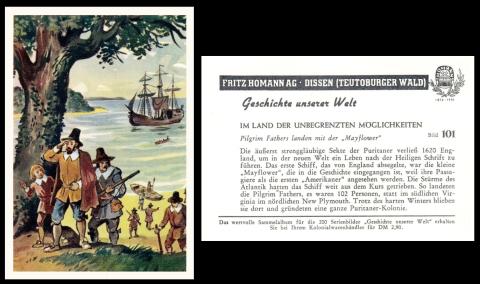
Question 2:
How are Turkeys connected with Thanksgiving?
In 1621, after a successful harvest, a group of colonists wanted to celebrate, so they made food from their crops. Then the story varies. Some say they also cooked the chickens they had brought with them, others say they had brought turkeys with them, and different others say they went out and hunted some of those pesky birds who ran wild and devastated their crops. The truth is nobody took notes and all this is fiction, but it is a good story and it has led to the poor turkey being seen as fair game ever since. What we do know is that there was a ceremony, and they asked the neighbours, the Wampanoag, who brought food to share. And that later on it all went pear and they ended up at war, and that was pretty much the end of the Native Americans` way of life and freedom.
This set was designed to fit in a hard back, 88 page album, which are fairly easy to acquire. However I do not know what was so special about 1951. I do know that Fritz Homann founded his first factory in Dissen in 1876, so that explains the first date, though not why the subjects on the cards date back further than this.
Now we can thank Stuart Arnold for filling in a lot of the blanks here, for he wrote in to say that Teuta Margarine was a brand by Fritz Homann, of Dissen, in the Teutoburger Wald, or the Teutoburg Forest, and that is famous as being the site of a great battle, which is also known as the Varus Disaster. This took place over three days in September, the 8th to the 11th, in 9 A.D., between the attacking Roman forces and the native German ones. In fact the Germans had set up an ambush, and they fought off three legions of men under the charge of Publius Quinctilius Varus, hence the alternate name. The Germans were led by a man called Arminius, or in some reports, called Hermann the Cherusker - and to explain that, it seems like Hermann was the Germanic way of pronouncing Armin [ius], and he was a Chieftain of the Cherusci tribe - however there was something very unusual about him, for he was a German who had not only taken Roman citizenship, but had received Roman military training, which he then used to defeat them in his former homeland. And it was such a rout that the Romans abandoned any plans to press on into Germany. What I do not know is whether something happened that altered the feelings of Arminius towards Rome - or whether it was all an elaborate plan because he felt so certain that one day the Romans would be coming for Germany.
Returning to the margarine, the brand name of "Teuta" is almost certainly a double salute to the area of Teutoberg, and maybe even a celebration and a memory of the grand battle The company also had other margarines - "Frihodi", which came from FRItz HOmann DIssen - "Homa", from the first four letters of his surname - and "Fri-homa", from part of his first and second name. Now "Fri-Homa", whilst not issuing cards, did issue small white plastic models, in various series, and you can marvel at those courtesy of Mokarex/Fri-Homa. We briefly featured a card as an aside which was issued with that very margarine as our Card of the Day for the 7th of January 2025 - but we also used another card, issued with "Resi" margarine in the 1950s as our Card of the Day for the 12th of October 2025
After that Homann stopped making food of any kind. It is often written that they went over to producing what they call wood fibreboard, and we call hardboard, but this is incorrect, because they had been producing hardboard since the late 1940s. So why they stopped the food, who knows. Do you?
